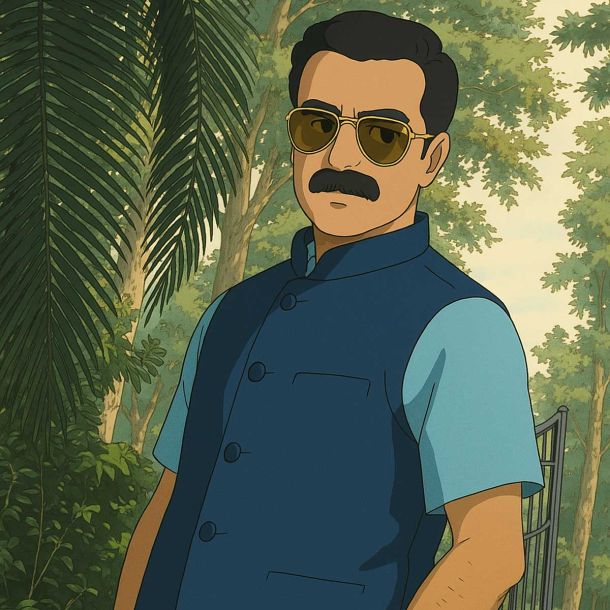More Coverage
Twitter Coverage
Satyaagrah
Written on
Satyaagrah
Written on
Satyaagrah
Written on
Satyaagrah
Written on
Satyaagrah
Written on
Join Satyaagrah Social Media
Martyrs’ march into the history - Rajguru: The Invincible Revolutionary

Jag Mohan, Bhagat Singh’s nephew and an eminent writer, states that it is wrong just to celebrate the birth-centenary of Bhagat Singh alone. Mother Vidyadevi, his grandmother and Bhagat Singh’s mother, always maintained that no picture could be complete by including her son only, as Bhagat Singh, Sukhdev and Rajguru lived and sacrificed themselves for their nation together. She always kept Rajguru’s Sholapuri shoes and Sukhdev’s kulla along with the personal belongings of her son.
Many authors have written books on Bhagat Singh. Mathura Prasad Thapar, brother of Sukhdev, wrote a book to preserve his memories. Unfortunately, Rajguru has not received enough attention from authors. He is only mentioned as one of the comrades of Bhagat Singh. In reality, he was a Karmayogi, always working selflessly and never expecting any credit or praise in return. Everybody would agree that he always longed to sacrifice himself for his nation. The desire to see his motherland free had peaked beyond fanaticism.
If there was some job involving the risk to life, Rajguru was always there to volunteer in the first place. Sadly, Rajguru could not attract the attention of authors and film makers. He was even neglected in his own city and state.
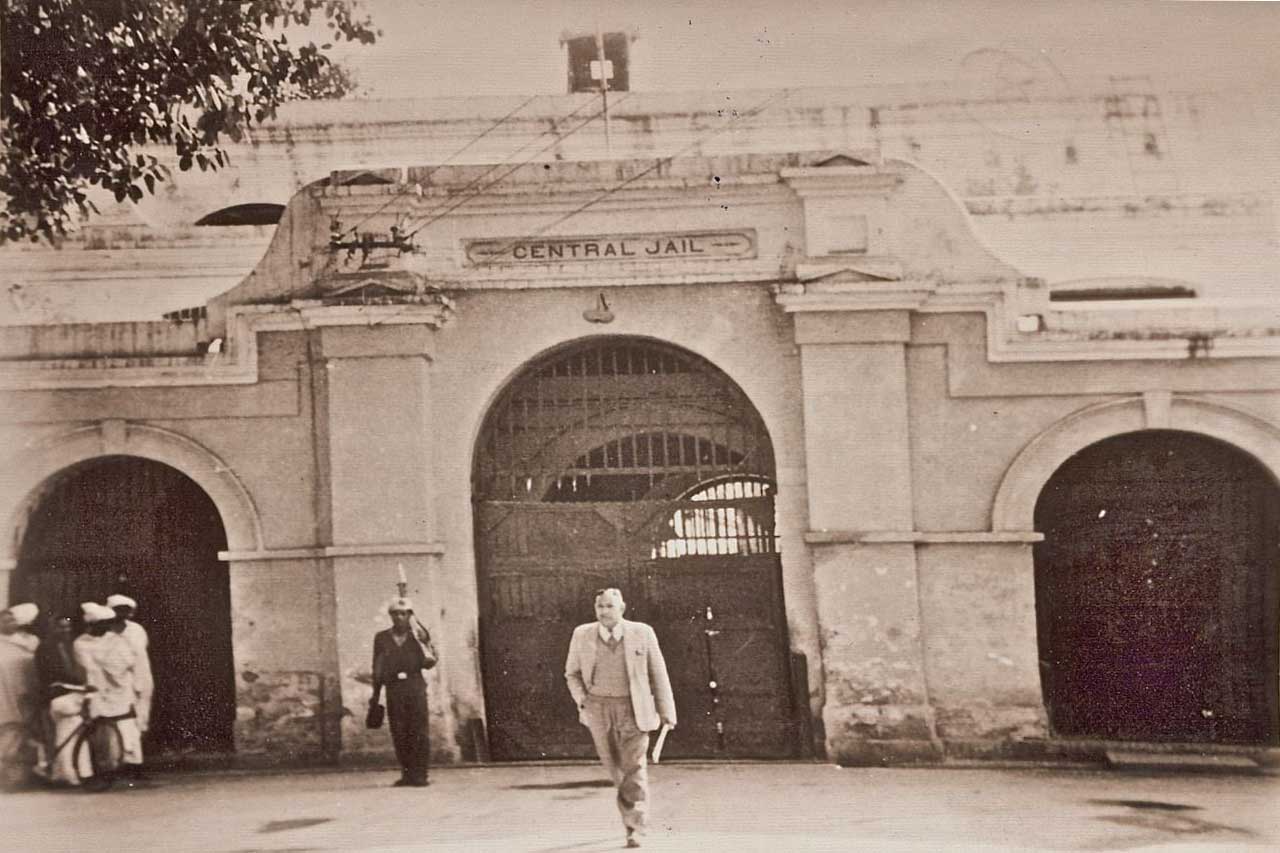 Central Jail, Lahore |
Central Jail, Lahore
March 23, 1931
6 am
The day had just broken out. The sun, as always, had arisen in the east, but its radiance today was dull. The ever present frightening silence inside the perimeter seemed to make the prisoners even more desperate. All inmates had anxiety and despair written over their ashen faces, as if some big storm was coming.
The routine got underway, though at a much slower pace. Everybody wanted to talk, express their apprehensions, but some hidden fear prevented them from doing so.
However, the scenario looked totally different in barrack number fourteen and cells near it, which housed Sardar Bhagat Singh, Rajguru and Sukhdev. They all emanated an aura of peaceful calm and good health. They were quiet, yet cheerful, free from all worries and unaffacted by what was happening around them.
This was an astonishing sight for jail authorities as everybody knew that their hanging had been scheduled at 0700 a.m. sharp on 24th March 1931, the very next day. They were to meet this tragic end for having revolted against the British rule for seeking freedom for their motherland. They had only 24 hours to live, yet showed no signs of the impending dreaded event.
12 Noon
As a way of tradition, the family members and relatives of the inmates are allowed to meet their beloved ones, a day prior to the hanging. In these last meetings, varied sentiments prevail. The communication usually is non-verbal, as words fail the relatives in these moments. Only a film of tears blurs the last glimpse of their dear ones.
The relatives of these great revolutionaries had also assembled at the gate of the jail by noon. Sardar Aijunsingh, the grandfather of Bhagat Singh, along with his son, Sardar Kishan Singh, daughter-in-law, Smt. Vidyawati, Smt. Parvati Devi, widowed mother of Rajguru along with her daughter, Smt. Ralli Devi, widowed mother of Sukhdev along with her brother-in- law and many other relatives, friends, well wishers and hundreds of others who wanted to treasure the last ever meeting with their beloved ones, with which they could live the rest of their lives.
The tyrannical authorities permitted only the parents of the prisoners to meet their sons, declining access to other relatives. The parents did not accept this and refused to have this last meeting. They were suddenly transformed into a symbol of courage and fortitude as they did not allow their tender sentiments to take over the pride of the self and the nation.
This news spread like wildfire among public and journalists, present outside. Within minutes, a sensational scene began to emerge when loud echoes of slogans praising the revolutionaries and condemning the heartless Government, from inside the jail, synchronized with those from outside. The dull atmosphere suddenly turned volatile and situation threatened to go out of control.
The brave mothers, however, correctly sensed that this situation could end into unavoidable firing and undesirable bloodshed of innocent people. They decided to sacrifice the desire to meet their sons and moved out of the jail premises. The mesmerized crowd followed them.
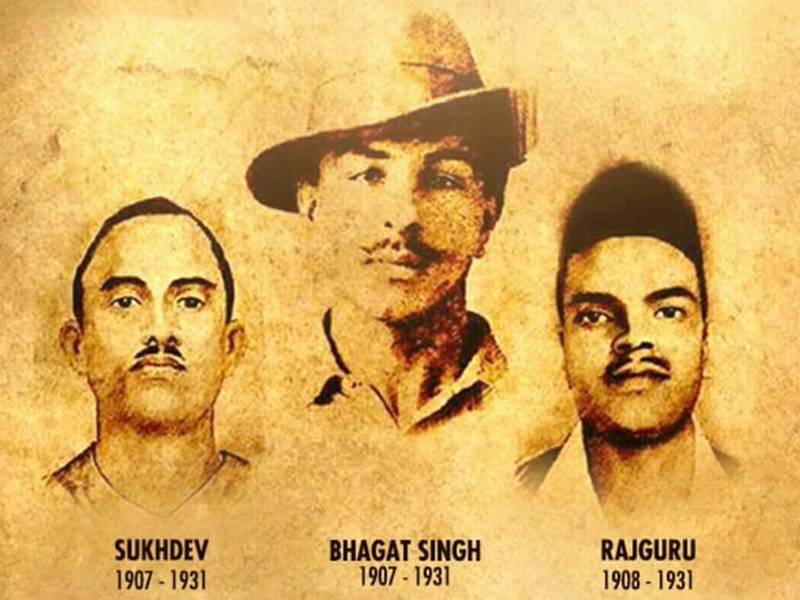 |
1 pm
Inside, unruffled by these happenings, Bhagat Singh was engrossed in reading revolutionary Lenin, a book gifted by his lawyer, Prannath Mehta. Mehta also went on to meet Rajguru and was equally taken aback by his relaxed and carefree attitude, even in the face of imminent death.
He remembered that Rajguru had become quiet and withdrawn, a few days before the sentence was pronounced. Everybody felt that he was nervous at the sight of imminent death and tried to lift his mood. Rajguru, then, disclosed to Shiv Verma, one of his colleagues, “Before meeting you people, every moment of the nineteen years spent by me in this world, brought a new disappointment on account of poverty and want of love and the life always appeared worse then hell. All this changed in company of you all within these last three years.”
Shiv Verma had put a direct question about whether he was scared of death and Rajguru had said that “I am, like you, proud of what I have accomplished. I have come to realize this truth only after challenging death. If we are able to show even a glimpse of the freedom to our fellow nationals by sacrificing our lives, they would be able to walk on that path by themselves. This death, then, would be blessing for us.”
After being awarded the death sentence, Rajguru had again become his usual self and was seen laughing at himself and others, including jail employees. Many thought that he was reacting excessively out of fear of death, but soon realized that it was the basic non-chalant attitude, which Rajguru had always maintained.
4 pm
Sardar Chattar Singh, a retired Army Hawaldar and now the Chief Warden of the Central Jail, Lahore was a kind hearted man, who was respected by all prisoners, including revolutionaries, to whom he extended great warmth. Today he appeared distant and stern.
Barkat, the barber, looked very depressed. He in whispers, disclosed to some prisoners the news of shifting of time of hanging. It was to take place at seven p.m. this evening, eleven hours before the scheduled time. Though the evening hanging was against the provisions of the Jail Manual, the terrified British Government could be expected to violate any rule or tradition.
Khan Bahadur Mohammed Akbar, the Senior Jailor, was no less agitated. He however, did not let anybody realize as to what was transpiring in his mind. Even then, for once his tongue did falter “Who can know what I am going through and what these boys actually mean to me.”
The dutiful Jailor and staff, however, had left no stone unturned in making all necessary arrangements for this unlawful execution. The Lahore Conspiracy Case undertrials were called back from the Courts much earlier than schedule. Chattar Singh curtly ordered locking of all prisoners in hot and suffocating barracks at 4 p.m. instead of routine sunset time. The armed guards started patrolling continuously inside and outside the jail. No body was allowed to come in or move out. Curtain and blinds were drawn to stop a direct view. The jail closed in the afternoon instead of late evening.
What a mockery it was. The weary and sad looking faces of jail employees contrasted with bright and cheerful faces and proud walk of those, who knew that they had only few moments to live.
7 pm
Bhagat Singh, Rajguru and Sukhdev took their last bath and put on black clothes provided by the jail officials. The doctor recorded their weight and was surprised to note that all three had gained weight since last recording.
They demanded not to be handcuffed. Chattar Singh feared this could not be granted, being against the rules, but the heavy hearted Jailor consented. Everybody wished that the time would stop but this did not happen.
The lions moved out of their cages, had a good look at each other and then leaped to have a warm embrace. The smile over their faces signified the grace with which they had lived and now were welcoming the death. They, then, locked their arms, Bhagat Singh in the centre, Rajguru on his right and Sukhdev on his left side and started to march, surrounded by Jail officials and wardens. Bhagat Singh started to sing and both joined him immediately.
Dil se niklegi naa mar kar watan ki ulfat
Meri mitti se bhi khusboo-e-watan aayegi
(दिल से निकलेगी ना मर कर वतन की उल्फ़त
मेरी मिट्टी से भी खुश्बुवे वतन आयेगी)
(Even my ashes will emanate the fragrance of soil of my land)
The three gallows stood erected on a big scaffold on one corner of the ground. The Deputy Commissioner, Lahore, accompanied by Jail Superintendent and government officials. An English Duputy Commissioner, stood on other corner. He looked perplexed at the sight of their free hands.The three gallows stood erected on a big scaffold on one corner of the ground.
Bhagat Singh immediately noticed his concerns and turning towards him, said, ‘‘Well, Mr. Magistrate, you are fortunate to be able to see how Indian revolutionaries can embrace death with pleasure for the sake of their supreme ideal.” This act of sheer bravery in the face of imminent death left everybody stunned and speechless.
They started to climb stairs and reached near the scaffold. Bhagat Singh bade good bye to both fellows. They immediately shouted “Long live Bhagat Singh (Bhagat Singh Zindabad). Bhagat Singh too joined the chorus and all three shouted aloud “Long live Our Struggle (Inqulab Zindabad). The echoes filled the sky.
The signal had reached in the barracks. Prisoners from all corners started the shouts of a “Long Live Bhagat Singh (Bhagat Singh Zindabad), Long Live Sukhdev (Sukhdev Zindabad), Long Live Rajguru (Rajguru Zindabad), Long Live Our Struggle (Inquilab Zindabad), down with the imperialism (Samrajyavaad Murdabad). The noise was deafening.
The crowd outside also received the message of the imminent and inevitable and became turbulent. Sardar Kishan Singh was addressing a huge rally near Mori Gate, a short distance away from jail. Pandit K. Santanam, Manager of the Laxmi Insurance Company, broke this heart breaking news to him. His grace and courage was unaffected by the sadness of the moment and he continued his speech with great composure, so that the crowd could remain in control.
On being asked about their last wish, Bhagat Singh asked for leave of two minutes. On being granted, they once again shouted “Down with imperialism, down with Union Jack, Inquilah Zindabad and finally, Vande Mataram” They had a look at each other for the final time as if reminding each other to keep company in the other world too and kissed the ropes.
The hangmen, with trembling hands, tied their hands and feet and covered the faces with the black masks. They were made to stand on the trapdoors on the platform and ropes were looped round their necks. The knots were positioned below the chins.
The Magistrate looked at his watch: 7.33 p.m. and raised his hand.
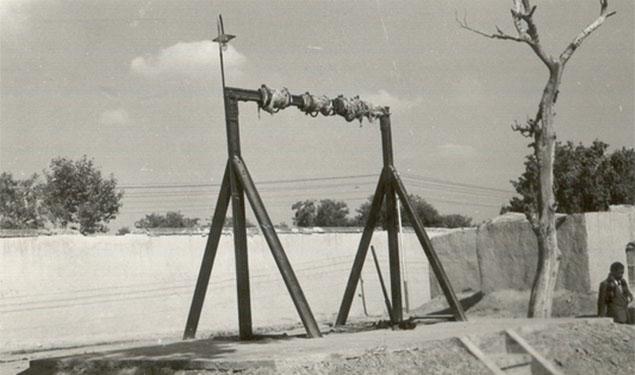 Here is an old photo of the place in Lahore jail Pakistan where Bhagat Singh Rajguru and Sukhdev was hanged |
Bolts were drawn, the trapdoors jerked open. The bodies shot downwards and then stopped abruptly. There was sudden jerking of head, followed by violent convulsions of the body. In the twilight of the setting sun, the moving shadows looked most scary.
The lives ebbed out within moments and bodies became limp. They were released and placed on the ground. The doctor examined the bodies and pronounced them dead.
The martyrs were on the path to immortality.The history had been written.
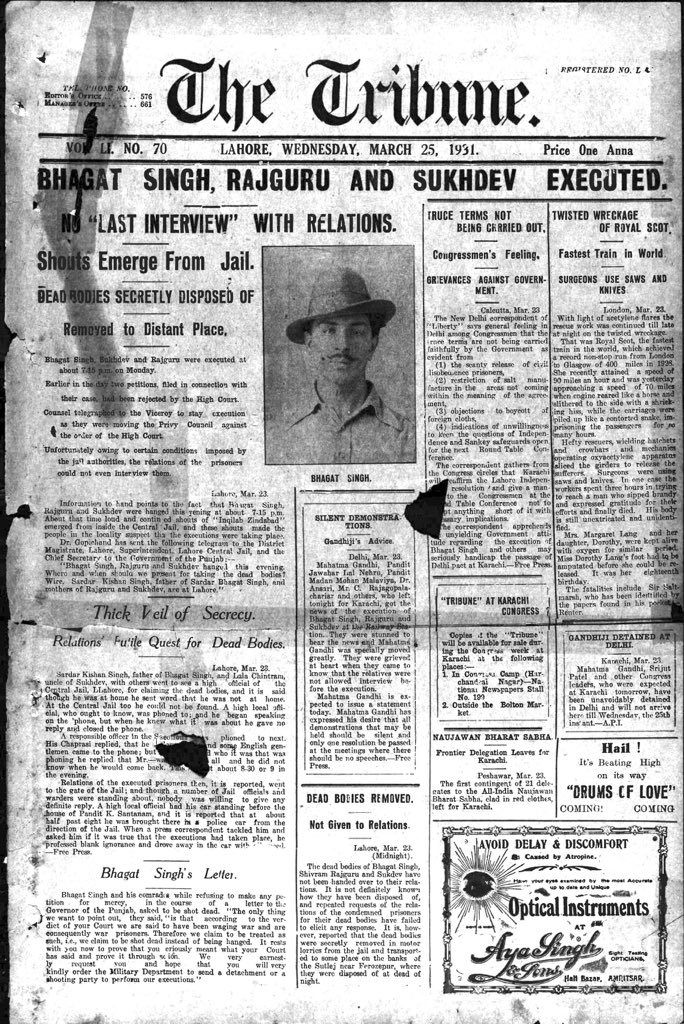 An image of Page 1 of The Tribune dated March 25, 1931 carrying the news of the hanging |
SOURCE:
Rajguru : The Invincible Revolutionary - Anil Verma
 Support Us
Support Us
Satyagraha was born from the heart of our land, with an undying aim to unveil the true essence of Bharat. It seeks to illuminate the hidden tales of our valiant freedom fighters and the rich chronicles that haven't yet sung their complete melody in the mainstream.
While platforms like NDTV and 'The Wire' effortlessly garner funds under the banner of safeguarding democracy, we at Satyagraha walk a different path. Our strength and resonance come from you. In this journey to weave a stronger Bharat, every little contribution amplifies our voice. Let's come together, contribute as you can, and champion the true spirit of our nation.
 |  |  |
| ICICI Bank of Satyaagrah | Razorpay Bank of Satyaagrah | PayPal Bank of Satyaagrah - For International Payments |
If all above doesn't work, then try the LINK below:
Please share the article on other platforms
DISCLAIMER: The author is solely responsible for the views expressed in this article. The author carries the responsibility for citing and/or licensing of images utilized within the text. The website also frequently uses non-commercial images for representational purposes only in line with the article. We are not responsible for the authenticity of such images. If some images have a copyright issue, we request the person/entity to contact us at This email address is being protected from spambots. You need JavaScript enabled to view it. and we will take the necessary actions to resolve the issue.
Related Articles
- A troubled childhood - Rajguru: The Invincible Revolutionary
- A Great man Beyond Criticism - Martyrdom of Shaheed Bhagat Singh (Some Hidden Facts)
- Kartar Singh Sarabha - The Freedom fighter who was Hanged at the age of 19 and inspired Bhagat Singh
- Our first true war of independence lie forgotten within the fog of time and tomes of propaganda: Sanyasi Rebellion, when "renouncers of the material world" lead peasants in revolt against British and fundamentalist islamic clans
- Vinayak Damodar Savarkar – A Misunderstood Legacy
- Godse's speech and analysis of fanaticism of Gandhi: Hindus should never be angry against Muslims
- Tirot Singh: An Unsung Hero of the Khasi Tribe who destroyed British with his skill at Guerrilla Warfare
- Cross Agent and the hidden truth of massacre of Jallianwala Bagh - Martyrdom of Shaheed Bhagat Singh (Some Hidden Facts)
- Fearless female sniper Uda Devi, who etched history during the Siege of Lucknow!
- Bhagat Irwin Gandhi - Martyrdom of Shaheed Bhagat Singh (Some Hidden Facts)
- Unsung Heroine Pritilata Waddedar, Who Shook The British Raj at the age of 21
- Rana Sanga, the symbol of bravery who defeated Sultan Ibrahim Lodhi and fought Muslim Terrorists for Hindu Existence
- Anuj Dhar claims that Subhas Chandra Bose was suspected of being ‘poisoned’ after ouster from the post of Congress president
- On 16th Aug 1946, during Ramzan's 18th day, Direct Action Day aimed to provoke Muslims by mirroring Prophet Muhammad's victory at Badr, Gopal 'Patha', the Lion of Bengal, heroically saved Bengali Hindus & Calcutta from a planned genocide, altering history
- How Political ambitions of the Congress has silenced contributions of uncountable freedom fighters
